Achieve a radiant glow with our best skincare products. From cleansers and toners to serums and moisturizers, find solutions for every skin type and concern.
Showing 1–12 of 133 results

Acne Squad Face Wash With Salicylic Acid & Thymol T Essence 100ml
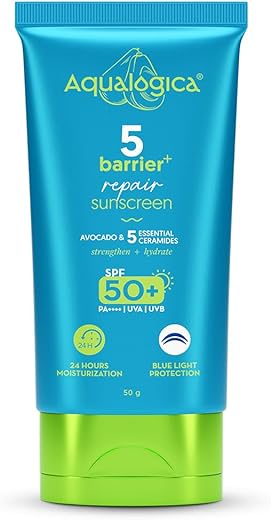
Aqualogica 5 Barrier+ Repair Sunscreen 50g

Aqualogica Detan Sunscreen | Detan+ Dewy 50g
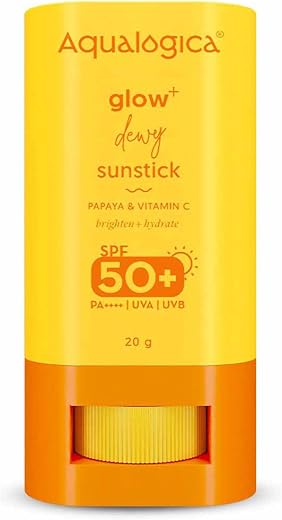
Aqualogica Glow+ Dewy Sunstick With Papaya & Vitamin C 20g
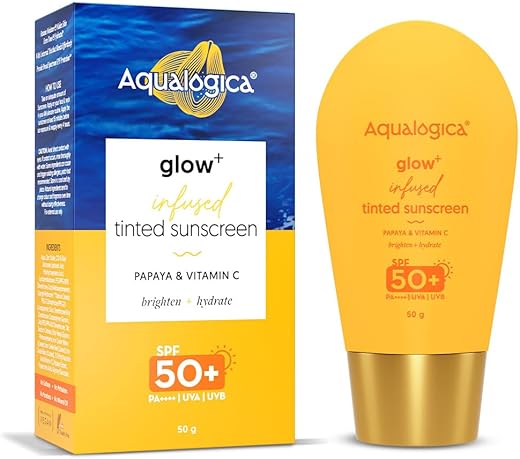
Aqualogica Glow+ Infused Tinted Sunscreen 50g
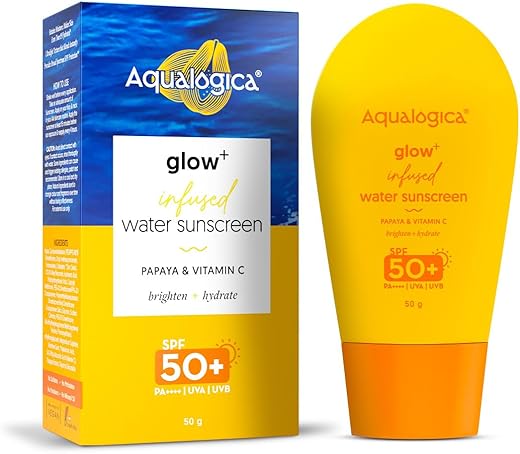
Aqualogica Glow+ Infused Water Sunscreen 50g

Aqualogica Sunscreen for Oily Skin | Illuminate+ Dewy 50g

Aqualogica Sunscreen Green | Hydrate+ Dewy 50g

Aqualogica Sunscreen SPF 50 | Glow+ Dewy 50g

Aqualogica Sunscreen Watermelon | Radiance+ Dewy – 50g
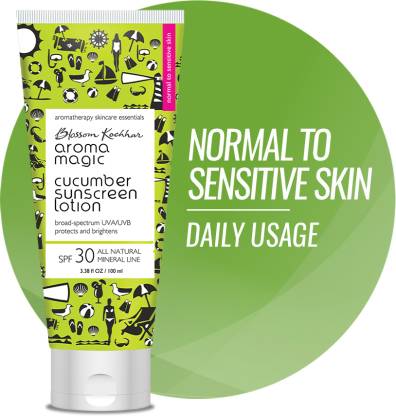
Aroma Magic Sunscreen – SPF 30 PA++ Cucumber Sunscreen Lotion 50 ml
FAQs
1. What is a basic skincare routine?
A basic skincare routine consists of three main steps:
- Cleansing: Removes dirt, oil, and impurities.
- Moisturizing: Hydrates and protects the skin barrier.
- Sunscreen: Protects against UV rays (applied in the morning).
For more advanced routines, you can add treatments like serums, exfoliants, or masks.
2. How do I know my skin type?
Common skin types include:
- Normal: Balanced, not too oily or dry.
- Oily: Shiny, prone to acne and enlarged pores.
- Dry: Flaky, tight, and prone to irritation.
- Combination: Oily in the T-zone (forehead, nose, chin) and dry elsewhere.
- Sensitive: Easily irritated, prone to redness.
Consult a dermatologist if you’re unsure about your skin type.
3. How often should I wash my face?
Wash your face twice a day—once in the morning and once at night. Over-washing can strip your skin of natural oils, leading to dryness or irritation.
4. What’s the difference between a moisturizer and a serum?
- Moisturizer: Hydrates and locks in moisture to protect the skin barrier.
- Serum: A lightweight product with concentrated active ingredients (e.g., vitamin C, hyaluronic acid) to target specific concerns like wrinkles, dark spots, or acne.
5. Can I use the same skincare products year-round?
Your skin’s needs may change with the seasons. For example, you might need a heavier moisturizer in winter and a lighter one in summer. Adjust your routine based on how your skin feels.
6. What’s the best way to treat acne?
- Use a gentle cleanser and non-comedogenic products.
- Incorporate ingredients like salicylic acid or benzoyl peroxide.
- Avoid picking or popping pimples, as this can cause scarring.
- Consult a dermatologist for persistent acne.
7. Are natural or organic skincare products better?
Not necessarily. While natural ingredients can be beneficial, they may also cause irritation or allergies. Focus on products that suit your skin type and address your concerns, regardless of whether they’re natural or synthetic.
8. How do I choose the right sunscreen for my face?
Look for a broad spectrum sunscreen with SPF 30 or higher. Choose a lightweight, non-comedogenic formula designed for facial use. Mineral sunscreens (with zinc oxide or titanium dioxide) are ideal for sensitive skin.
9. What’s the purpose of exfoliation?
Exfoliation removes dead skin cells, unclogs pores, and promotes cell turnover. Use a chemical exfoliant (like AHAs or BHAs) or a gentle physical scrub 1-3 times a week, depending on your skin type.
10. Can I use retinol if I have sensitive skin?
Yes, but start with a low concentration and use it 2-3 times a week to avoid irritation. Always follow up with moisturizer and sunscreen, as retinol can make your skin more sensitive to the sun.
11. What’s the best way to fade dark spots?
- Use products with ingredients like vitamin C, niacinamide, or alpha arbutin.
- Apply sunscreen daily to prevent further darkening.
- Consider professional treatments like chemical peels or laser therapy for stubborn spots.
12. How do I treat dry skin?
- Use a gentle, hydrating cleanser.
- Apply a rich moisturizer with ingredients like ceramides or hyaluronic acid.
- Avoid hot showers and harsh exfoliants.
- Use a humidifier in dry environments.
13. Can I use multiple serums at once?
Yes, but layer them from thinnest to thickest consistency. Avoid combining ingredients that can irritate the skin, like retinol and vitamin C, unless your skin tolerates it.
14. What’s the difference between a toner and an essence?
- Toner: Balances the skin’s pH and removes any leftover impurities after cleansing.
- Essence: A lightweight, hydrating product that preps the skin for serums and moisturizers.
15. How do I know if a product is causing a reaction?
Signs of a reaction include redness, itching, burning, or breakouts. Stop using the product immediately and reintroduce it slowly to confirm. Patch-test new products before applying them to your face.
16. Can I use skincare products during pregnancy?
Some ingredients, like retinoids and salicylic acid, should be avoided during pregnancy. Stick to gentle, pregnancy-safe products and consult your doctor if you’re unsure.
17. What’s the best way to prevent wrinkles?
- Wear sunscreen daily to protect against UV damage.
- Use products with retinol, peptides, or antioxidants.
- Stay hydrated and maintain a healthy lifestyle.
18. How do I care for oily skin?
- Use a gentle, foaming cleanser.
- Opt for oil-free, non-comedogenic products.
- Incorporate ingredients like niacinamide or salicylic acid to control oil production.
19. Can I use expired skincare products?
No. Expired products can lose their effectiveness or harbor bacteria, leading to irritation or infections. Check the expiration date or look for a period-after-opening (PAO) symbol on the packaging.
20. What’s the best way to layer skincare products?
Follow this general order:
- Cleanser
- Toner
- Essence
- Serum
- Moisturizer
- Sunscreen (morning only)
Always apply products from thinnest to thickest consistency.
Skin Care: Simple Steps for Healthy Skin
Skin care is important for maintaining healthy skin. It protects us from the environment and helps us look our best. Taking care of your skin can be simple and rewarding.
Understanding Your Skin Type
The first step in effective skin care is identifying your skin type. There are five main types of skin: normal, oily, dry, combination, and sensitive.
- Normal Skin: Balanced moisture with no excess oil.
- Oily Skin: Shiny and may have larger pores.
- Dry Skin: Flaky, rough, or tight-feeling skin.
- Combination Skin: Oily in some areas and dry in others.
- Sensitive Skin: Reacts easily to products and environmental factors.
Knowing your skin type helps you choose the right products for your skin care routine.
Basic Skin Care Routine
A simple skin care routine includes three main steps: cleansing, moisturizing, and protecting.
- Cleansing: Start by washing your face twice a day. Use a gentle cleanser that suits your skin type. This step removes dirt, oil, and makeup.
- Moisturizing: After cleansing, apply a moisturizer. This helps maintain your skin’s hydration. Choose a product that matches your skin type. For dry skin, use a thicker cream. For oily skin, opt for a lightweight lotion.
- Protecting: Sun protection is essential. Use sunscreen with at least SPF 30 daily, even if it’s cloudy. This step helps prevent sun damage and reduces the risk of skin cancer.
Adding Products to Your Routine
After establishing your basic skin care routine, consider adding other products based on your skin’s needs. Here are some common types of skincare products:
- Toners: Toners can help balance your skin’s pH and remove any leftover dirt after cleansing.
- Exfoliators: Exfoliators remove dead skin cells. Use them 1-2 times a week. Physical exfoliants include scrubs, while chemical exfoliants contain acids that dissolve dead skin.
- Serums: Serums are concentrated treatments targeting specific concerns like wrinkles or dark spots. Choose a serum that addresses your primary skin issues.
- Eye Creams: These products nourish the delicate skin around your eyes. They can help reduce puffiness and dark circles.
- Night Creams: A richer moisturizer can be used at night. During sleep, your skin repairs itself, so nourishing it with a night cream can be beneficial.
Natural Skin Care Options
Some people prefer natural skin care products. Look for items with minimal ingredients. Ingredients like aloe vera, tea tree oil, and shea butter are gentle and effective. However, always patch-test new products to avoid allergic reactions.
Lifestyle Choices for Healthy Skin
Your skin care routine is important, but lifestyle choices also play a significant role.
- Hydration: Drink plenty of water. Staying hydrated helps keep your skin supple and radiant.
- Nutrition: Eat a balanced diet rich in fruits, vegetables, and healthy fats. Foods high in antioxidants can protect your skin from damage.
- Sleep: Aim for 7-9 hours of sleep each night. Good rest supports skin repair and rejuvenation.
- Stress Management: High stress can impact your skin negatively. Practice relaxation techniques like yoga or meditation.
- Avoid Smoking and Limit Alcohol: Smoking and excessive alcohol consumption can harm your skin. Quitting smoking and limiting alcohol can improve your skin’s appearance.
Consulting a Professional
If you have persistent skin issues, consider consulting a dermatologist. They can provide tailored advice and recommend products that suit your specific needs.



